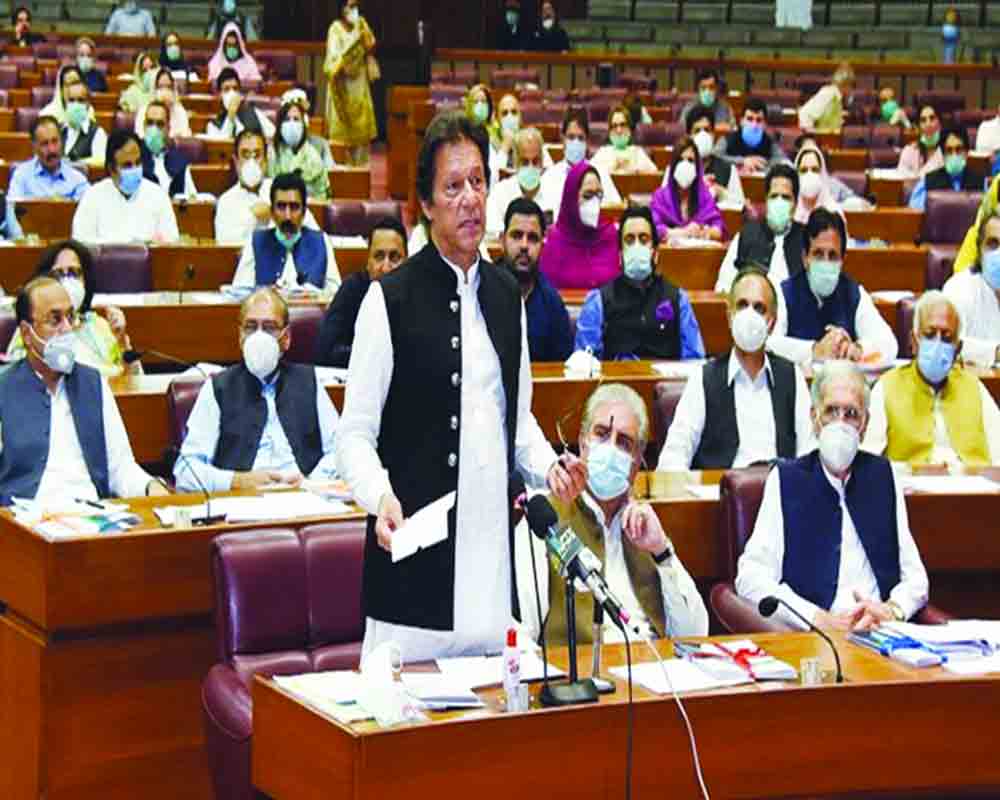Imran started with the promise of bringing a change in governance but he also has been caught in the old maze of religion and military Generals
Three years ago, Imran Khan swept to power with a reformist rallying cry to deliver ‘Naya Pakistan’ (New Pakistan). His political vehicle PTI (Pakistan Tehreek-e-Insaaf) was equated to a veritable ‘jazba’ (passion) — the party’s official site noted, “addressing the root causes of religious extremism” as amongst its foundational ideology. Much hope was riding on the proverbial “political outsider”, who did not belong to any of the boroughs plaguing Pakistan such as the feudatory system, military barracks or the madrasa-schooled ignoramuses. Imran had seemed refreshingly different as an Oxford-educated, successful (captain of the World Cup-winning Pakistani cricket team), well-travelled, liberal (had earlier married a westerner of Jewish faith) — he seemed just the right candidate to course-correct Pakistan from the slippery slope of religious extremism, terror ecosystem and ignorance.
Today, as it enters the fourth year, ‘Naya Pakistan’ reeks of sameness to the past, only more obviously and decidedly so. Imran’s theatrical railing and opposition to the law unto themselves, Pakistani ‘Generals’, prior to his ‘selection’ , is a forgotten memory, as the beholden Imran Khan dutifully extended the current Pakistani Chief of Army Staff’s tenure, continuing the Military institutions tradition of extraconstitutional levers. The Pakistani Military’s penchant for control with a civilian façade has led to many calling the system a ‘Hybrid Martial Law’. Meanwhile the political discourse amongst the civilian politicians too has reached unprecedented lows, with personalised character assassination of the Opposition leaders, unsubstantiated attributions, intemperate and mocking tone to populist rhetoric to hide the Government’s failures, one after the other. Imran’s crass language and undignified allusions have sunk the conversations far below the relatively pedestrian standards of the likes of Nawaz Sharif, Asif Zardari, Pervez Musharraf or even the clearly bigoted, Zia-ul-Haq.
Upon becoming the PM, Imran had promised a lean team of ‘change leaders’ and ushered in a 21-member Cabinet — today, it has bloated to 54, comprising other party members that Imran harangues against today, or made up with unelected members. The name-calling and blame-game has only become shriller, with the ‘past’ as the most invoked means of deflecting any awkward attention from the crumbling present.
However, it is on the issue of religious extremism that the failure of Imran has been spectacular and regrettable. Signs started early with him axing an internationally renowned economist from his panel of advisers, Atif Mian, only because of his faith (Ahmadi), whom the puritanical Pakistani Government does not recognise as Muslim. Soon, Imran’s Government (and the Military) were seen cutting ‘deals’ with the likes of Tehreek-i-Labbaik (TLP) instead of taking stern action for fanning poison in society on the issue of blasphemy. Meanwhile, offering patronage and succour to organisations like Jamaat-ud-Dawa and Sipah-i-Sahaba continued unabated. For a society mired in regressive chauvinism and sexism, Imran chipped in with his own shocking observations like, “If a woman is wearing fewer clothes, it will have an impact on men” and recently on the falling educational standards in a madrasa-rife Pakistan, Imran solely blamed the ‘English-medium education’! Imran’s solution to train children and society properly was only to teach them Seerat-un-Nabi (Biographies of the Holy Prophet). But Imran’s religiosity, like his morality, remained flexible and predicated on convenience — on one hand he accused French President Emmanuel Macron of ‘encouraging Islamophobia’, and in the case of the clearly persecuted Chinese Uighur Muslims, he rather ingloriously and meekly surrendered saying that he accepts the “Chinese version” due to “extreme proximity and relationship” with Communist China!
For a nation that has steadfastly remained under the infamy of being ‘Greylisted’ on the international terror financing watchdog agency, FATF, the comments emanating from Pakistan on the Taliban are shocking self-goals of complicity. From senior PTI leader Neelam Sheikh’s “Taliban is with us to free Kashmir”, to Interior Minister Sheikh Rashid taking credit for India’s ostensible “defeat” with the advent of Taliban in Afghanistan — Pakistan is openly legitimising and welcoming the Taliban, in Afghanistan. Imran has remained vocal, passionate and unsuccessful in positing the counter-narrative of Pakistan as a “victim” of terror, yet the man known as ‘Taliban Khan’ continues the patent Pakistani doublespeak on issues like the Taliban, religious extremism and modernity. The last hope standing against the darkness of Taliban, Amrullah Saleh, excoriates Imran’s Government by insisting, “Afghanistan is too big for Pakistan to swallow”; yet, in the last three years, that is the yeoman service done by Imran towards burning Afghanistan.
Irony dies a thousand deaths when Imran’s PTI ends its falsehoods on its official party site by ending the portion on its “mission” by quoting celebrated secularist Faiz Ahmed Faiz’s immortal lines, “Jab raaj karegi khalq-e-khuda; Lazim hai ke hum bhi dekhengey” — who actually wrote this against Zia’s illiberal, doctrinaire and degressive misuse of religion towards orthodoxy. Imran has been a schizophrenic usurper of identities to present the “winning identity” from an electoral perspective, and sadly in a country facing caught in the vortex of extremism, it is only befitting that Imran contextualises and justifies the likes of Taliban or expansionist China, whilst stuttering his way in broken Urdu, half-sincerely quoting Faiz!
(The writer, a military veteran, is a former Lt Governor of Andaman & Nicobar Islands and Puducherry. The views expressed are personal.)


























